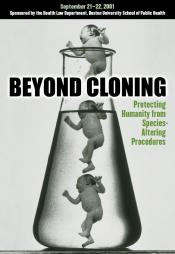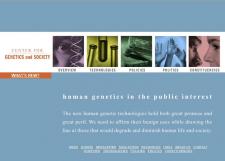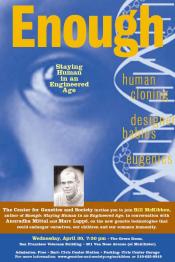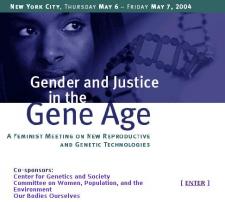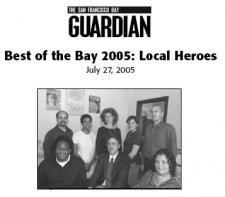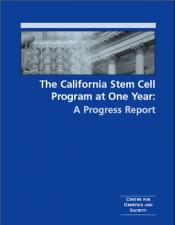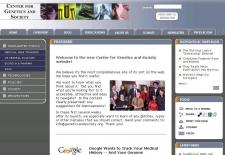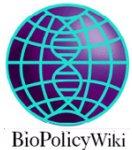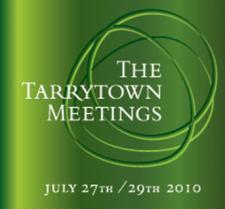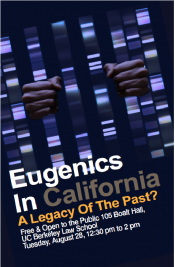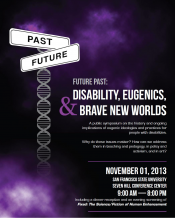2001
The Center for Genetics and Society was established in August after a period of outreach, discussions and conferences conducted by its predecessor organization, the Exploratory Initiative on the New Human Genetic Technologies. This initial phase of our work, conducted as a project of Public Media Center in San Francisco, involved alerting dozens of leaders of scientific, medical, women's health, environmental, human rights, social justice and other constituencies to the need for policies addressing the new human genetic technologies.
In September CGS co-sponsored the conference Beyond Cloning: Protecting Humanity from Species-Altering Procedures at
2002
In 2002 CGS played a major role in introducing the concerns of liberal and progressive constituencies into the human cloning debates in the U.S. Congress and at the United Nations. CGS hosted a reception and briefing for 120 UN delegates, press and others in conjunction with the beginning of negotiations for a treaty to ban human cloning. The Center issued an open letter the US Senate on its cloning debate, signed by over 100 liberal constituency leaders, health experts, and others. We continued our efforts to educate previously uninvolved constituencies in the social issues surrounding new human genetic and reproductive technologies, and the need for political engagement. CGS staff members appeared at numerous conferences, and were quoted in national media. We launched a website, put our email newsletter on a regular monthly publication schedule, and moved into new offices.
2003
In 2003, CGS initiated and co-sponsored, with the Heinrich Boell Foundation and the Institut Mensch, Ethik und Wissenschaft, the first international NGO conference focused on the social and political implications of new human genetic technologies, Within and Beyond the Limits of Human Nature. In addition, we presented our first major public event – an evening symposium in
2004
CGS entered electoral politics in 2004 by engaging pro-choice and other progressive organizations in California concerning the serious flaws inherent in Proposition 71, the $3 billion Stem Cell Research and Cures Initiative, and going on to provide key leadership in opposing the measure. In May, CGS held the ground-breaking conference, Gender and Justice in the Gene Age. This conference led to the establishment of CGS’s Gender, Justice and Human Genetics Program [PDF]. In addition, the Center organized a series of well-attended symposia addressing the need for a broad civil society initiative addressing the new human genetic technologies, culminating in December with the
2005
During 2005 CGS underwent a major expansion in staff, constituency outreach and media presence, and played the lead role in holding California’s new stem cell program accountable to the public interest. In the course of the year, CGS staff members presented at dozens of conferences, symposia and other public events; and were cited in well over 100 accounts in local, national and international press outlets. In July, the San Francisco Bay Guardian newspaper named CGS the "local hero" organization for 2005 [PDF] in its special Best of the Bay issue. At the beginning of the year CGS had six staff; by November we had eleven.
2006
Highlights of 2006 included the passage of a
2007
During 2007 CGS gave priority attention to our communications work in traditional and online media, and to outreach efforts. We authored a record number of articles and op-eds published in key outlets including the Los Angeles Times, Boston Globe, Newsday, Philadelphia Inquirer, San Francisco Chronicle, New Scientist, Hastings Center Bioethics Forum, World Watch, and others. We were quoted on almost a weekly basis in publications including the New York Times, Washington Post, Dissent, USA Today, Associated Press, Christian Science Monitor, Wired, New England Journal of Medicine, New Scientist, Colorlines and Alternet.org, and appeared regularly on radio and television. We also launched our redesigned and updated website. In addition, CGS staff presented at over 30 conferences, symposia, and other organizational events.
2008
CGS staff gave invited testimony in June 2008 before a US House Foreign Affairs Subcommittee about international regulation of genetic and other human modification technologies, and in November 2008 before California’s "Little Hoover" Commission about governance and accountability at the California stem cell agency. We were quoted in dozens of news articles; authored articles in publications including The American Interest, The Washington Post (online), the Journal of Law, Medicine and Ethics, and the San Francisco Chronicle; and co-published a report with the Center for American Progress titled Geneticizing Disease: Implications for Racial Health Disparities [PDF]. We launched BioPolicyWiki, the first wiki-style compendium of biotechnology policies in countries around the world, and organized invitational strategy sessions involving approximately 65 key colleagues in five cities. CGS's Gender and Justice program became an independent organization, Generations Ahead.
2009
The year opened with an invitation to CGS staff to meet with members of President-elect Obama’s transition team, at which time we submitted and published Responsible Federal Oversight of the New Human Biotechnologies: Opportunities for the New Administration [PDF]. The highly publicized birth of octuplets and a fertility clinic's offer of genetic selection for eye, hair, and skin color led to numerous media appearances, including CNN, The Today Show, Fox News, and The Wall Street Journal, and invitations to speak and write about the need for public policies on assisted reproduction. We issued Playing the Gene Card? A Report on Race and Human Biotechnology, and filed an amicus curiae brief in support of the groundbreaking lawsuit by the American Civil Liberties Union and Public Patent Foundation challenging the constitutionality of human gene patents. CGS staff published essays in Democracy, The American Interest, New Scientist, Newsday, AlterNet, and more. We began planning for the first annual invitational meeting for people committed to ensuring that human genetic, reproductive, and related emerging technologies support rather than undermine a healthy, just, and sustainable human future.
2010
In July CGS hosted the inaugural Tarrytown Meeting, the first of three planned annual events. More than 100 invited advocates, scholars and others gathered over three days to consider what can be done to ensure that human biotechnologies support rather than undermine social justice, human rights, ecological integrity and the common good. The Tarrytown Meetings, and the network of individuals and organizations participating in them, are the culmination of a series of strategy consultations with colleagues and allies. Along with several other groups and individuals, CGS played a key role in a controversy that resulted in UC Berkeley revamping a problematic gene-testing program for entering students. CGS staff authored articles, spoke at conferences and symposia, and were cited in the media on topics including assisted reproductive technologies, direct-to-consumer gene tests, progressive biopolitics, synthetic biology, DNA forensics, patents on human genes, protection of research subjects, race and genetics, and potential new methods for human genetic modification.
2011
Over 120 invited advocates, scholars, scientists, policy makers, artists and others met on July 25-27 for the second annual Tarrytown Meeting. Special plenary sessions highlighted international concerns and the prospects for educational curricula addressing the social implications of human biotechnologies. CGS organized events in Berkeley and Los Angeles with noted authors Dorothy Roberts (Fatal Invention) and Mara Hvistendahl (Unnatural Selection), and with GeneWatch UK executive director Helen Wallace. We played advocacy roles in controversies involving egg donation, sex selection, gene patenting, and synthetic biology. CGS staff authored articles appearing in publications including The American Prospect, Contraception, The Hastings Center Report, New Scientist and Slate, and were quoted in articles appearing in many outlets including Al Jazeera, Associated Press, Forbes, Foreign Policy, JAMA, Los Angeles Times and Salon, addressing stem cell fraud, forced sterilization, eugenics, human cloning, DNA forensics, gamete donor anonymity, designer babies, the misuse of racial categories in genetic research and other topics. Psychology Today invited us to publish regular commentary on their website, and we began the CGS Twitter feed.
2012
More than 100 colleagues gathered at the third and concluding Tarrytown Meeting in July. Leading up to the meeting was our first series of web-based interviews, “Biopolitical Conversations,” featuring Bill McKibben interviewed by Marcy Darnovsky, Dorothy Roberts interviewed by David Winickoff and Harriet Washington interviewed by Lisa Ikemoto. In August we organized a strategy meeting and public symposium at UC Berkeley on the legacies of eugenics in California. CGS played advocacy roles in public controversies involving stem cell research oversight in California, human gene patenting, and proposals in the UK and the US for procedures that would constitute human germline modification. CGS staff were quoted in articles and stories appearing in outlets including Associated Press, Forbes, The New York Times, The Globe and Mail, Le Monde, Slate, Washington Post CBS News, NPR, PBS News Hour and ABC News Radio, addressing exploitative surrogacy practices, egg freezing, synthetic biology, fetal DNA testing, sex-selection and other topics. During 2012 CGS initiated and successfully completed a staff leadership transition, with associate executive director Marcy Darnovsky set to take over from departing founding executive director Richard Hayes at the start of 2013.
2013
In 2013, Marcy Darnovsky took the helm as the new Executive Director. We celebrated policy victories in June when the U.S. Supreme Court ruled unanimously that naturally occurring human genes cannot be patented, and in August when California Governor Jerry Brown vetoed a state bill that would have permitted researchers to pay women for providing eggs and undermined protections for them. We continued to oppose efforts to gain regulatory approval for human germline modification via “mitochondrial replacement” techniques.
We co-organized Future Past: Disability, Eugenics and Brave New Worlds, a full-day public symposium in November, and four public events on synthetic biology and human biotechnology in conjunction with the SynBioWatch consortium. Our online interview series, Talking Biopolitics, showcased new work by Miriam Zoll, George Estreich, Ruha Benjamin, Donna Dickenson, Regan Brashear, Alexandra Minna Stern and Corey G. Johnson.
2013 was a bumper year for our media and communications work. Commentaries and articles by CGS staff were published in top-tier outlets including The New York Times, Nature, Scientific American and The Wall Street Journal. We wrote for our own blog Biopolitical Times, and for our group blog at Psychology Today, Genetic Crossroads. Our Twitter and Facebook accounts grew by about 50% and 40% respectively. Our staff were cited or interviewed in more than 130 news stories.
Last modified May 19, 2014




